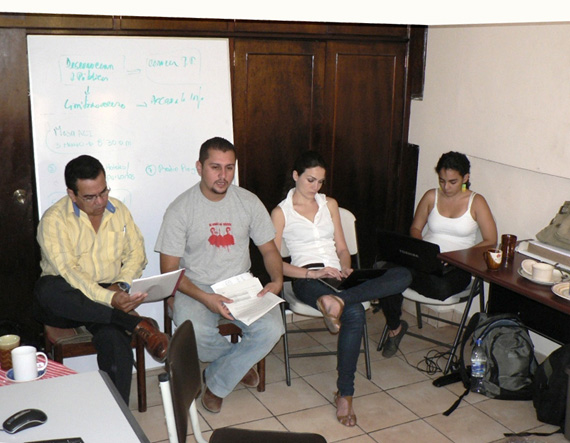|
The
investigation conducted by the International Human Rights Mission to Bajo Aguán
revealed that the peasant families in the area are living in a total state of
defenselessness, with their rights systematically violated amidst growing
impunity. Juan Chinchilla’s story is a clear example of this tragic situation.
Juan Chinchilla,
a member of the Movimiento Unificado Campesino del Aguán (United Peasants
Movement of Aguán, MUCA) and of the provisional Executive Committee of
the National Popular Resistance Front (FNRP), was kidnapped last Jan. 8
by a group of paramilitaries and public security agents.
Beaten and
tortured, he was finally able to get away from his captors. Two months later,
Chinchilla is still afraid to move about in the open and does not reveal his
whereabouts.
He agreed to
talk with Sirel to denounce
to the world the state of defenselessness in which he is living, and his firm
resolution not to give in and to continue struggling.
-Two months
have gone by since your kidnapping. Do you feel that your life is still in
danger?
-The threats
are constants. My friends get messages on their cell phones telling them to
prepare body bags because they’re going to have to pick me up in pieces. My
parents’ house and the settlement where I live with my family are being watched.
A few days ago,
strangers fired at the vehicle I was riding in. It’s obvious that I’m being
watched and that they know all my moves. I feel that my life is still in danger.
-How do you
manage to go on with your life when you’re being persecuted like this?
-I know that
we’re waging a struggle here, and I or any of my fellow activists can get killed
at any time. I’m being careful and taking measures so that I won’t be an easy
target.
-Why do you
think you’re being persecuted like this?
-I’m a member
of MUCA and the Resistance, and the goals of both organizations are to
change this country and built it up on new foundations, so that everyone can
enjoy decent living conditions. These goals clash with the interests of the
businesses that operate in Valle del Aguán, which are working together with the
repressive forces of the state.
|
A
few days ago, strangers fired at the vehicle I was riding in. It’s
obvious that I’m being watched and that they know all my moves. I
feel that my life is still in danger. |
We’ve even seen
United States helicopters flying over the region, and there is no doubt
that there are foreign paramilitary forces advising the government in its
repressive actions.
Also, the
FNRP does not recognize the Porfirio Lobo regime and it rejects the
anti-popular measures this government is taking. What’s more, we’re not
accepting the elections programmed for 2013.
The government
continues to repress and murder its people, and it seeks to discredit and
criminalize our struggle by claiming we’re armed. The only weapons in Bajo Aguán
are in the hands of the security guards working for the palm producers, or are
held by foreign agents.
-The
International Mission found that human rights are being systematically violated
in the area and that impunity is the norm. Do you think it’s worth risking your
life for this struggle?
-I’m fully
aware of what I’m doing and -I’ve said it already- if I have to give my life for
it, I’ll do it. I know that there are a lot of landless families in Valle del
Aguán and that more than 75 percent of the people of Honduras are living
in extreme poverty.
The region has
been militarized and people are being repressed and murdered. We’re fighting to
change this situation. Risking my life for this goal is an honor for me.
-How important for this struggle
is international solidarity and the presence of the Mission?
-Very
important, and I thank their efforts, because they are letting the world know
what is happening here. This Mission gives us strength to carry on
fighting, because it supports us and our people.
I am also
calling out to the international community to stop funding this regime and the
companies involved in repressive actions.

|